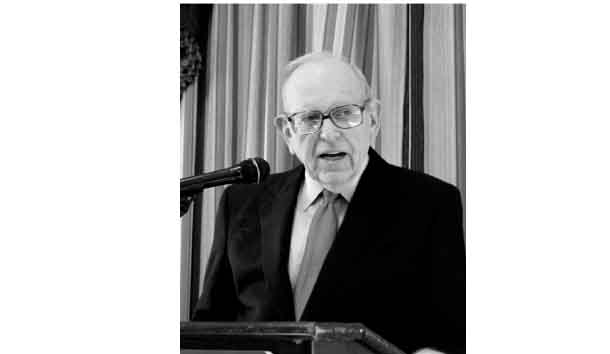Prof. William J. Quirk taught at the University of South Carolina School of Law for 44 years. In that capacity, he influenced and encouraged hundreds of students. A favorite class was his survey of the Constitution. Guided by Professor Quirk, students contemplated and discussed such matters as the Articles of Confederation, the Treaty of Paris, and the Kentucky and Virginia Resolutions of 1798. Instead of trying to make sense of the High Court’s latest usurpation, students delved into Jefferson’s and Madison’s debate on whether the earth belongs to the living and the extent to which previous generations can bind their progeny with chains of debt.
Professor Quirk was a man of intellect, integrity, and generosity. He died on September 22, in Columbia, South Carolina.
Although he was born in the northeast and loved New York City, Professor Quirk was a Jeffersonian at heart. He distrusted centralized power and viewed all branches of government as agents of the people. In one of his final writing projects, Professor Quirk averred that “[t]he holder of a delegated power . . . must decide whether or not the proposed action is within his grant. He may be wrong, but if he is, he’s accountable to the grantor and no one else. The branches are separate and coequal and the grantor is the people.” What a cogent summary of the old republican principle of departmentalism.
From 1992 through January 2014, Professor Quirk was a frequent contributor to Chronicles, writing on such diverse topics as birthright citizenship, the 2008 financial crisis, and the Constitution’s amendment process.
Before his affiliation with Chronicles, Professor Quirk served as a contributing editor to The New Republic. His articles appeared in such sundry publications as The American Scholar, Fortune, and the Washington Post.
Professor Quirk was the author of several books, including Courts & Congress: America’s Unwritten Constitution (2008). In this book, Professor Quirk aptly identified the relations among the three branches of the federal government as a “Happy Convention” in which elected representatives punt the most controversial issues to the courts for resolution. In exchange for the aggrandizement of judicial power, the High Court allows Congress to borrow and spend at will without regard to the Constitution’s delegated powers. In Quirk’s view, Congress spends to “keep its members in office, but it out-sources its responsibilities.” Professor Quirk pointed out that Congress could curb the Court’s power at any time with a simple jurisdiction-stripping bill. He provided a detailed history of these “strippers” and rightly concluded that Congress didn’t have the stomach to reclaim its constitutional authority over sticky policy issues.
Unlike many professors who look upon students as necessary evils, Professor Quirk relished their company. All those who knew Professor Quirk well will affirm that he was happiest when discussing politics and political theory with a group of students in one of Columbia’s better restaurants. Professor Quirk had a knack for keeping the conversation going and ensured that everyone participated. He was a gifted listener and actually cared to hear what his students thought.
Although he owned an apartment in the Big Apple and practiced law there for over a decade before coming to South Carolina, Professor Quirk was a devoted fan of the Boston Red Sox. Once or twice each summer, Professor Quirk would invite a group of friends to attend a Yankees-Sox series at Fenway Park. Goodness knows how much he paid for those field-level tickets, but if ever the game got out of hand for the Sox, the Professor would shake his head and mumble, “Let’s go.” We’d then find our way to a Boston pub, wonder why anyone would pay J.D. Drew ten million dollars for his .250 batting average, and discuss the latest shenanigans going on in Congress or the White House.
Professor Quirk’s mind remained sharp as he aged, battled esophageal cancer, and recuperated from various maladies. I vividly recall participating in a debate at The John Randolph Club just a few years ago with the Professor on the other side. He deftly turned my cross-examination of his argument into a triumph for his team, as I waited for Steve Berg and Tom Piatak to pull me out of the hole I had dug.
Bill Quirk was my teacher, mentor, and friend. With his passing we have lost a true gentleman-scholar. He will be missed.

Leave a Reply